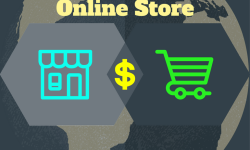Realistic Perspective on eCommerce Site
Have you been reading a lot about eCommerce? Do you find yourself discussing more often than not about how eCommerce has transformed businesses and those who are not “online” have missed the growth boat? And not to mention the noises in your head about websites being built in five minutes and your eCommerce web store be up and running in 24 hours. It’s the bug and you have been bitten. But, you are not alone in this. And you know it!
We are into the business of building and hosting online stores, we come across many whom we give a head start on getting into the game and the best advice we give to newbies in eCommerce is it’s not a good idea to create a web store.
Yes, that sounds strange and you must be thinking why would we ruin our own business.
Our answer is, we don’t want to build our business by ruining theirs.
And, why do we think their business might be ruined?
- Because eCommerce is NOT about building a website.
- Because eCommerce is not ONLY about selling a product.
- Because eCommerce is NOT winner takes all segment.
- Because eCommerce is HUGE, its expanse is vast and the territories volatile.
eCommerce is like any other business. Yes, it’s simpler in a way that the online world is now full of tools that can help you get the much-needed data and tips and it can do wonders for people who are shy to market offline; but eCommerce is not about using tools and data either. It is about skills and sources - many and new ones each day.
Your eCommerce business plan might actually be more complicated and time-consuming than a brick-and-mortar store set-up.
Do you know what (or what all) are you going to sell online? Of course, you do! Else you wouldn’t be thinking about this.
Let’s put this differently, where do you think you can get all these products (that you want to sell) from? Have you heard of sourcing, suppliers and dropshipping?
You have a good network and you found someone to supply you the product. How do you intend to send it to the customer? Yes, there are a lot of shipping companies but what if the product is not delivered? What if you found the supplier in a wrong place? What if the product turns out to be defective and there is no replacement policy with the supplier?
What if there occurs a payment fraud? How do you handle it? Let’s not forget the taxes.
This is only for starters. In this age and time, it’s inevitable to be hooked to social media and do social selling; consuming nearly 70% of your time, attention and efforts.
The idea of selling online can be overwhelming if you haven’t sold online before. However, that should not discourage you. The sole purpose of this blog is to educate aspiring online sellers and to provide realistic perspective.
Here are some telltale signs that starting an online store is a different ball game.
1) Customers are always right but seldom nice
eCommerce is a service business. You have to be on top of things to ensure your customers get the products they are looking for, and equally important is they are happy, not alone satisfied with the purchase. The worst part is you hardly ever get to see these people coming into your store and yet you have to gauge their demand, preferences and well, moods too. One dissatisfied customer could write a bad review about you online and it’s visible to many. In fact to all the people who visit your online store and also who haven’t yet and might never. Thanks to the social media and it’s power to enable instant venting of emotions and its readily available audience to applaud and console!
Your first step is to learn how to keep your eyes and ears open.
2) Things can go missing, deal with it
You have got the address correct, you have made no mistake labeling the parcel and yet it is not delivered to the customer. It is not uncommon. Although FedEx, UPS provide good services there are times when they might lose the parcel. And at times when it matters the most, like during holiday season. You will find yourself tracking the parcel and simultaneously convincing the customer that it is shipped timely. There could be more than one such instances happening. Once again, remember what an unhappy customer could do for you.
Those who are familiar with corporate world will know how valuable on-the-job training is. We advise the same for eCommerce aspirants. Get a feel for shipping and handling with assistance from someone who is already a pro at it. The already established marketplaces such as eBay or Amazon are your best internship grounds.
3) Only you think your product is unique
If you have honestly found a niche product to sell, that’s wonderful. But if you are going to sell cool t.shirts which you paint yourself you are in for a big surprise. Search and you will find out how many people are selling t.shirts and they all have an equally compelling story to share. If you are aiming to sell a product in a very competitive market, there are chances your web store will never rank in search engines even with targeted keywords, you will constantly question yourself if the pricing is correct because there is always someone trying to slash your product price and last, as a new seller you may find it difficult to make your presence felt amongst similar stores.
Still, you will have to write product descriptions that are unique. The ones no one reads but you cannot overlook its importance. Then there are product categories, product images and promoting those. And everything you display on your web store must be clear and explicitly mentioned. There is no room for assumptions.
4) Being web-savvy is more than using Facebook
If you have a hard time setting up an email account, banking online, you panic at using DIY software tools, things like WordPress and plugins make you think only a software engineer can understand this, then you are going to be incredibly frustrated operating your online store. When it comes to the eCommerce website, being web-savvy is a two-fold agenda. First, you are responsible for building the store, setting up categories, ensuring product images are well displayed, customer information system is received and stored properly, payment and shipping modules are integrated. All these needs a basic level of online competency if not a college degree.
Secondly, you are responsible for online marketing, using the social media to business advantage, reaching out to an audience through digital newsletters, networking, promotions, SEO, optimizing your website, etc. and you have to come up with your own creative ideas to go about these. Even if you find a professional to take care of your marketing needs, you should be able to explain what exactly you aim to do. In absence of that clarity, all your efforts to go all out on marketing may fail.
If you are still interested in this game and hopes springing high, here is what you should consider doing:
- Explore the eCommerce market through an established online marketplace - eBay, Amazon, Etsy. You will hear many say that “why to pay 5% transaction fees when you can add it to your own pocket”. That could be true once you have gained the experience. But as a beginner, that 5% is perhaps your best investment and it comes with unmatched learning.
- Learn the tricks of the trade - sourcing, shipping, payments, customer service, discounts, offer.
- Network with marketplace community - online eCommerce forums, LinkedIn groups.
- Start getting familiar with digital media - newsletter design and services, Facebook ads, twitter hashtags, etc. You can read about using Google+ for SEO here
- Give yourself 1 or 2 years to go through the entire online selling cycle and articulate the training. Make a note of three things: 1) What are you super good at 2) What you enjoy, 3) What you wish not to indulge in.
- Once you have a summary for yourself from point 5 above, you will know whether it’s time to take the next step - own online store.
Summary:
As it is with all businesses, there is no instant gratification in eCommerce too. To avoid stumbling and costly setbacks, set your expectations right. This is a great industry and you will never run out of opportunities if you know where you are headed.







